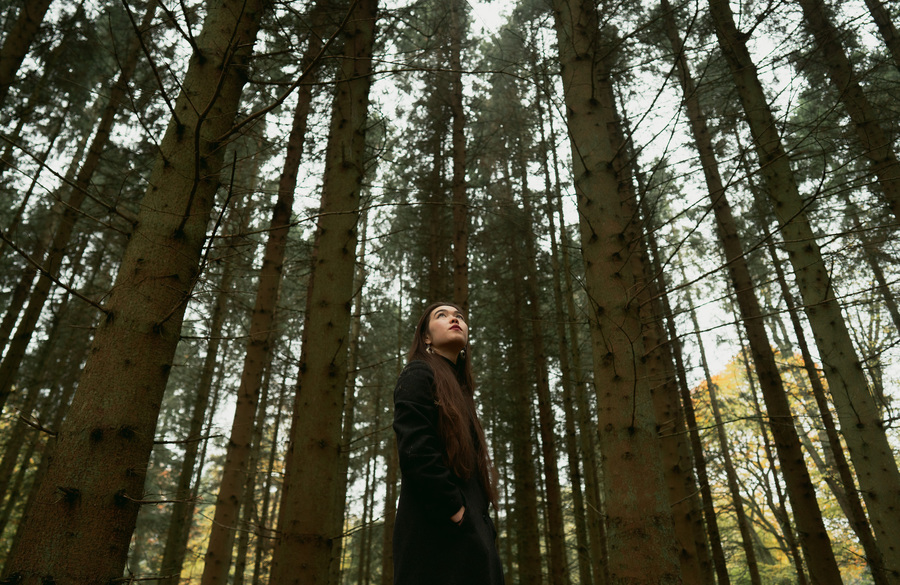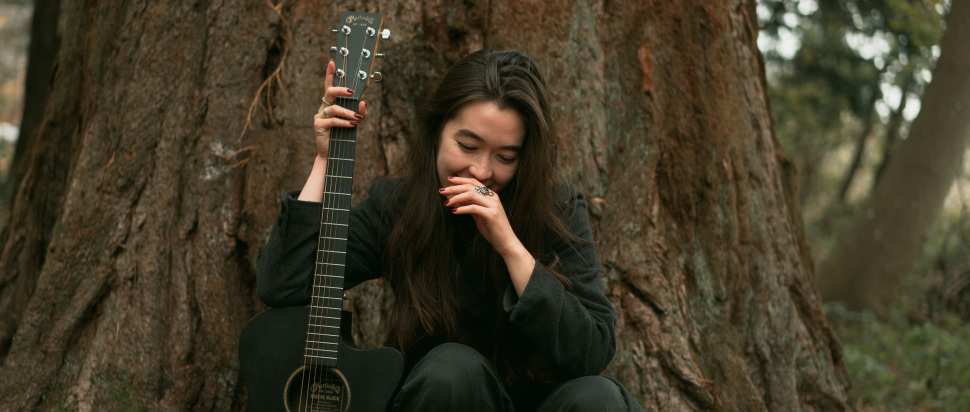Spotlight On... Miwa Nagato-Apthorp
Ahead of releasing her debut EP Noren at Alchemy Film & Moving Image Festival, we catch up with Hawick artist and folk musician Miwa Nagato-Apthorp
Hawick-based artist and folk musician Miwa Nagato-Apthorp is gearing up to release her debut EP Noren on 2 May via Alchemy Film & Arts. Named after a type of Japanese fabric divider, Noren looks to Nagato-Apthorp’s dual Japanese and Scottish heritage for inspiration. Working alongside fellow musicians Inge Thomson, Aiko Shimada, Haru Nagato-Apthorp and Seán Dowd, Noren is rich in storytelling and a truly captivating listen from start to end.
The resultant product of an Alchemy Film & Arts musician-in-residence scheme, it’s fitting that Noren will be celebrated with a launch show at their annual Alchemy Film & Moving Image festival in Hawick this weekend. We catch up with Nagato-Apthorp to find out more.
First of all, can you tell us a little bit about yourself and what inspired you to get into music?
When my family moved to the Borders I attended a rural primary school where I first encountered Scots language in song during workshops led by Susie Kelly and Elsa Lamaitre. The Twa Corbies stayed with me; it has a haunting melody and very morbid lyrics, it seemed to me that it sprung straight from the land itself. My parents are music lovers and were very encouraging of my love of singing. I had music lessons locally and spent a lot of my teenage years singing with friends.
In 2022 I applied for a residency with Alchemy Film & Arts as part of a project centred around local histories and ecologies. It was an extremely supportive environment where my songwriting was nurtured and there was a natural progression from writing one song, to another and so on.
You’re about to release your debut EP which beautifully brings together your Scottish and Japanese heritage. In your experience, what are some of the similarities, or in fact differences, that you’ve found between Scottish and Japanese folk traditions?
Something I love about folk music is that if you delve far enough back into many traditions, you’ll find that people are making the same sounds and talking about the same things. That being said, the rich world of Japanese folk music is something which I’ve only recently begun researching. The instruments and tonalities are completely different and I’ve only skimmed the surface. I have been dipping my toe in by learning songs in Japanese which has been a beautiful way to connect with my heritage.
What was it like exploring these different traditions to create your EP?
During the process of putting Noren together it became clear that the Japan/Scotland connection was coming to the forefront – because of my explorations of both Japanese and Scottish histories. As a dual heritage person, it’s very healing to bring these worlds together.
I’d love to know more about the stories behind the songs on the record – what can you tell us about each of the tracks, and why did you want to explore these histories in song?
The Bonded One is a ballad which tells the story of the Bondagers – women agricultural workers who lived and worked in the Scottish Borders, Midlothian, and Berwickshire in the 18th, 19th and 20th centuries. Despite growing up in the Borders I had never heard their story and decided to write a song imagining their perspectives on their lives and work.
Abigail was born out of a co-writing session with my pal Matthew Hickman of brownbear. Matt came up with a beautiful guitar part from which a melody naturally developed. I revisited it a while later and the whole song came out. It's a song about grief but there’s sweetness and joy in it too.
I learned that the town of Hawick got its name from the Hawthorn Tree. Hawthorn Song came about because I was interested to experiment with oral tradition and how songs adapt as they travel. We conducted a fast-forwarded oral tradition exercise where the song was learned and taught on by various local singers and musicians before being passed back to me. It came back sounding very different and with a new verse!
On a visit to Japan in 2022 I spent some time on Hiroshima Island with family friends. They took us to see the grave of a British sailor, Frank Toovey Lake, who died in 1868 aboard a British naval vessel anchored in the Inland Sea. His body was brought onto the Island and interred before the rest of the crew continued their journey. The people of Hiroshima Island have been tending his grave ever since. I was moved by the story and knew that it needed to be a song but it wasn’t until 2024 that I felt able to write it. We were experiencing a horrific period of fascist rioting UK-wide. It was a terrifying time for People of Colour. It felt like the time to tell a story about a community who have honoured and tended to the memory of a “foreigner” for almost 200 years. The Ballad of Frank Toovey Lake was co-written with my mum, Hiroko Nagato-Apthorp, who contemplated the story and wrote a poem in Japanese which forms the refrain of the song – I feel that there’s a potent energy to what she wrote and I loved collaborating with her.
I did a wonderful School of Song course taught by Adrianne Lenker; we had songwriting homework and one week I sat down to write and Silver Fish just poured out. Its meaning is still slightly mysterious to me but I think it’s in part about inspiration and being open to the importance of things.

Image: Miwa Nagato-Apthorp by Sanne Gault for Alchemy Film & Arts
And can you tell us more about Japanese folk song of resistance Takeda no Komoriuta and why you choose to include your own rendition as part of the EP?
Takeda no Komoriuta stunned me the first time I heard it. It’s the lament of a girl who is taken from her home to be the childminder for a wealthy family over the mountain. She talks about missing traditional festivals and her family. After performing it at Alchemy Film & Moving Image Festival 2023 it became an important part of my live sets and was a natural choice for the final track of the EP. Non-Japanese speakers often approach me after gigs and ask if the song is about homesickness. The meaning of the song seems to reach people even if they don’t understand the lyrics. Whenever I sing it, I think of the Palestinian people and their struggle for liberation under occupation and genocide. It’s a song about the heartbreak of being removed from your home.
On the record you work alongside a select group of talented musicians bringing a lived-in warmth to the record – what was the writing and recording process like with these other artists and how do you feel they enriched the project?
Working with Inge Thomson (producer) was a beautiful experience. She understood the songs completely and helped them to find their best expression through sensitive and interesting arrangements. Both her and Garry Boyle (recording, mixing) had a very generous way of sharing their expertise. I loved working with my brother, Haru Nagato-Apthorp (backing vocals), and partner, Seán Dowd (Vocals, Organ), who bring a real warmth to the tracks. The music of Aiko Shimada (vocals) was a formative part of my exploration into Japanese folk music; I was humbled when she agreed to bring her voice to Noren. The whole EP project was expertly produced by Zuzana Fryntová and the rest of the team at Alchemy Film & Arts. When I listen to Noren I hear the joy of all of those collaborations.
You’re launching your EP with a special performance as part of Alchemy Film & Moving Image Festival on 2 May – what can people expect on the night?
I’m so excited to launch the record at Alchemy! I have the lovely Eliza Cass, Haru Nagato-Apthorp, and Seán Dowd joining me to perform some tracks from the record ahead of the annual Alchemy Ceilidh. The whole festival has an energy of solidarity, community and care and I feel very privileged to be a part of it.
After this, what does the rest of the year look like for you?
A couple of gigs that I’m particularly looking forward to are Edinburgh Tradfest on 11 May with the wonderful Parsisonic and Dlù, and Under Canvas festival in July.
Noren is released on 2 May via Alchemy Film & Arts
Miwa Nagato-Apthorp plays Alchemy Film & Moving Image Festival, Hawick Town Hall, 2 May; Traverse Theatre, Edinburgh, 11 May as part of Edinburgh Tradfest; Under Canvas, Inverness, TBC
Follow Miwa Nagato-Apthorp on Istagram @miwanagato
